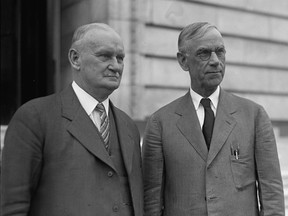Investment manager tried to arrange meeting between CEO Evan Siddall and former prime minister
Article content
The Alberta government’s desire to bring in former prime minister Stephen Harper to chair Alberta Investment Management Corp. was telegraphed so strongly that people within the province’s $160-billion-plus pension and endowment manager reached out more than once in the past year to try to set up a meeting between Harper and AIMCo’s now former chief executive, Evan Siddall.
Advertisement 2
Article content
However, sources say, a meeting between the two men did not happen.
Earlier this month, Siddall was abruptly relieved of his duties as CEO by Alberta Finance Minister Nate Horner while at an offsite gathering of AIMCo personnel in Edmonton. After Siddall left, Horner stuck around to tell the assembled staff what had just happened to their boss.
The government did not have the power to get rid of AIMCo’s CEO directly, only its 10-member board, which was done earlier the same day. Once Horner stepped into the role of chair and sole director, he relieved Siddall of his duties and promised the public a new board within 30 days. The following day, Ray Gilmour, Alberta’s deputy minister of executive council and the province’s top bureaucrat, was named interim CEO.
‘Strong support’ for Siddall
Alberta Premier Danielle Smith told the Calgary Herald on Friday that the new board, or at least some members, could be in place at AIMCo as soon as this week.
The purge of the board and CEO was an extremely unusual move by corporate governance standards. Siddall, who had been CEO since 2021, was not accused of any wrongdoing and the board had not tried or been asked to get rid of him, according to four sources who were not authorized to speak publicly about AIMCo.
Advertisement 3
Article content
In fact, the directors were largely happy with his performance, the sources said, with both internal employee satisfaction and external client assessments of performance improving under his leadership.
There was “very strong support for Evan,” said one source. “He completely turned things around.”
However, the board itself underwent significant changes in the year leading up to the en masse dismissals. Mark Wiseman — who took over as chair in June 2020, shortly after AIMCo had suffered a $2.1 billion loss on a volatility trading strategy and brought in Siddall to stabilize things — left at the end of 2023.
A few months later, in March, two new board members were appointed at AIMCo: Jason Montemurro and Joel Hunter, though Hunter’s three-year term didn’t begin until the following month.
The appointment of Montemurro, an Alberta tax lawyer, drew some attention because of his credentials and perceived connections to the United Conservative Party. He had made contributions to the UCP, which are publicly available, including $2,500 to Smith’s leadership campaign in May of 2022. Montemurro had also served as a partner in Azimuth Capital Management from 2007 to 2019, an energy-focused private equity firm that Harper is also associated with: he is listed as a working equity partner on Azimuth’s website. An inquiry about whether Harper is still with Azimuth has so far gone unanswered and he could not be reached for comment.
Article content
Advertisement 4
Article content
Tensions rising
Montemurro’s connections were not lost on some inside AIMCo, who already sensed tensions emerging with Danielle Smith’s government.
“The Premier’s been very clear in the past that she wants to see AIMCo invest in the energy sector in Alberta,” said Naheed Nenshi, leader of Alberta’s New Democratic Party, in a recent interview.
“She sees AIMCo as a sovereign wealth fund, if you like, of Alberta that will invest in things that are politically expedient.”
The government has cited rising costs at AIMCo without commensurate returns as the reason for clearing out the boardroom and dismissing Siddall. But Kenneth Kroner, a longtime AIMCo director who was named interim chair after Wiseman’s departure, wrote a letter to Horner last week countering the government’s narrative. In it, he included data showing that AIMCo is a low-cost manager compared to similar funds and has “solidly” exceeded benchmarks over the years.
“The misinformation (coming from the government) will make it unnecessarily difficult for the next management team to be effective,” Kroner said in the letter.
Advertisement 5
Article content
Siddall has not commented since his dismissal from AIMCo. But those around him are struggling to put together why he was let go.
Laurentian elite
One recurring theme is his past association with people considered by the Alberta government to be part of the “Laurentian elite,” such as former Bank of Canada governor Mark Carney, who was retained to advise the Liberals on economic policy and who many view as a potential candidate for the federal Liberal leadership should Prime Minister Justin Trudeau step aside.
Siddall’s appointment as a special adviser to Carney at the Bank of Canada in 2011 and several references to that, including in the brief biography accompanying an op-ed Siddall wrote in January of this year, still come up from a quick internet search of the two names. Though it was years ago that Carney and Siddall worked together at the central bank, two sources said their ties didn’t sit well with the Alberta government.
Siddall also had a connection to Bill Morneau, Trudeau’s former finance minister and a key figure in the early days of the Liberal government’s push to curb and tax carbon emissions. Under Siddall, AIMCo was mulling the creation of a fund with other institutional investors to invest in the energy transition to lower-carbon alternatives, an initiative that involved Morneau and the Boston Consulting Group. The board supported the exploration, according to two sources. But the government was concerned that it would be a “green” fund, in part due to Morneau’s involvement.
Advertisement 6
Article content
The perception that Siddall aligns himself with large-L Liberals or is somehow resistant to energy investments was surprising to some who know him well, noting his support for Conservative causes, including financially in his younger days. Moreover, Siddall was firmly established in the private sector as an oil executive — chief financial officer at Irving Oil — and investment banker at firms including Lazard and Goldman Sachs before taking the advisory job at the Bank of Canada.
Siddall was also explicit in public statements that he was not a fan of divestment of oil and gas assets while at AIMCo. In December of 2023, he told the Financial Post that a world without hydrocarbons was a “dreamland.” Previously, in a fall 2021 interview shortly after he became CEO, he said AIMCo would continue to invest in and capitalize on Alberta’s homegrown strength and expertise in energy throughout any transition to a lower carbon economy. He said that was simply an investment decision, not influenced by any government position on how AIMCo should position itself in the energy sector.
Advertisement 7
Article content
Other pension executives have attempted to strike the same balance. When John Graham took over as CEO of the Canada Pension Plan Board in February 2021, he said oil and gas divestment was not the way to go and that such stances by institutional investors reflected “a short on human ingenuity.”
According to one source, the transition energy fund Morneau and Boston Consulting explored in 2022 and 2023 never got off the ground at AIMCo because of a lack of sufficient interest from global institutional investors. Another source said it had gone cold before it came to the point of soliciting partners. A third source characterized it as one of many projects undertaken at AIMCo and said the attention paid to it was overblown due to political overtones. However, one source familiar with the undertaking suggested that money spent on the initiative, though a tiny part of AIMCo’s overall annual expenses that approach $1 billion, raised the ire of some inside and outside the organization because it displayed a “surprising” lack of attention to the political environment within which AIMCo was operating.
Advertisement 8
Article content
In August of 2023, Smith imposed a seven-month moratorium on the approval of large-scale renewable power projects over one megawatt, including solar, wind and geothermal so a series of new rules could be put in place to restrict projects on agricultural land and around protected areas with views. In addition, new projects will have to post bonds or other security to cover reclamation costs in the future.
Recommended from Editorial
-

Fired AIMCo chair disputes Alberta’s narrative on costs
-

How AIMCo’s performance stacked up before ‘shocking’ purge
-

Alberta fires entire AIMCo board, relieves CEO of duties
The government’s views were well-known within AIMCo, said three sources, with one adding that any perceived insensitivity on the investment manager’s side was short-lived, with efforts taken to avoid friction.
In February of this year, AIMCo rolled out a new fund called Energy Opportunities Pool, which drew in allocations from many AIMCo clients, according to a news release. The in-house fund pegged at $1 billion was described as “a fund dedicated to investing in the global energy transition and decarbonization sectors.”
The name of the fund initially included the word “transition,” according to one source, but, aware of sensitivities within the government, that word was dropped before the rollout.
• Email: bshecter@postmedia.com
Bookmark our website and support our journalism: Don’t miss the business news you need to know — add financialpost.com to your bookmarks and sign up for our newsletters here.
Article content
Alberta’s desire to install Harper at AIMCo well known
2024-11-19 16:43:42







